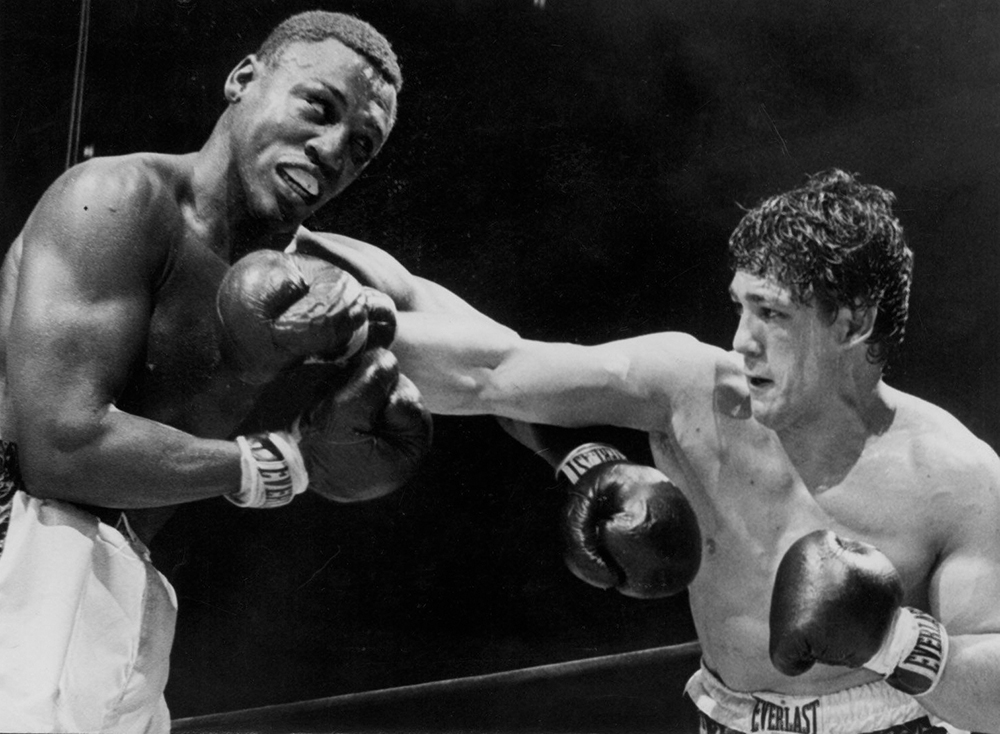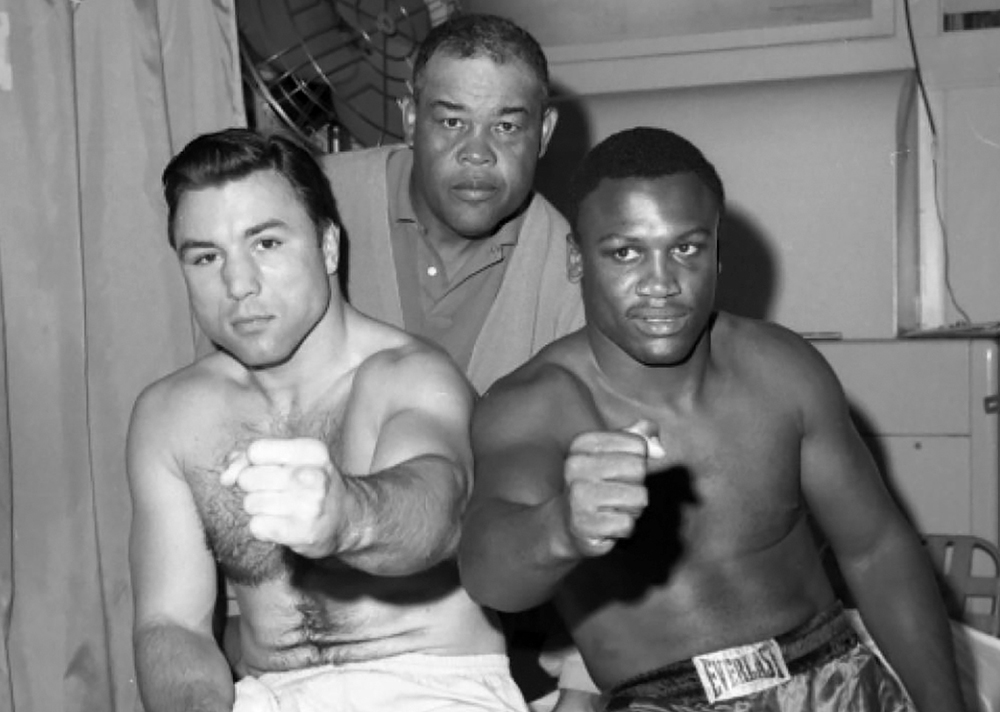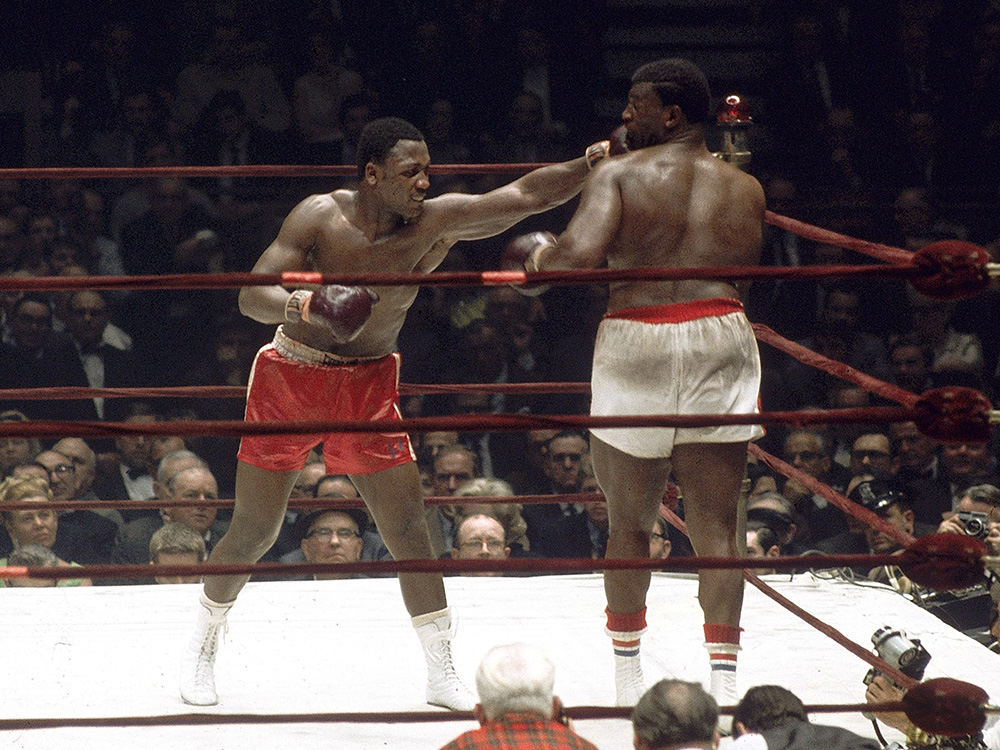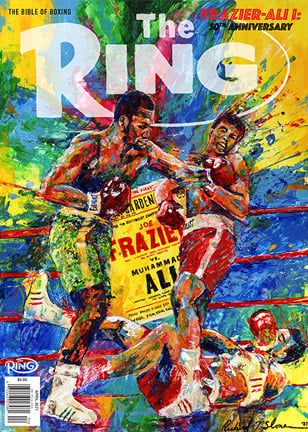
JOE FRAZIER
Record: 26-0 (23 KOs)
Age: 27 • Height: 5-foot-11½
Reach: 73 inches
Stance: Orthodox
Official Weight: 205½ pounds

 FRAZIER vs. Oscar Bonavena
FRAZIER vs. Oscar Bonavena
September 21, 1966 • Madison Square Garden, New York City
On this night, a young and undefeated Joe Frazier stepped up in class for the first time and proved himself worthy by twice getting off the deck to win a 10-round split decision. Ranked No. 9 in the world, Oscar Bonavena was a bull of a man with a plodding but dangerous style and far more experience than the 22-year-old Frazier, who was in only his 12th professional fight. Frazier had stopped his previous 11 opponents but twice ran into short right hands in a nearly disastrous second round that put him on the canvas for the first time in his career. He didn’t stay there long. Frazier shook off those right hands and took two mandatory eight counts before launching a vicious attack that easily won him the next four rounds as well as a close decision. His relentless body attack and inside fighting skills would become his trademark, but in this instance it led to Bonavena’s manager, Sid Martin, loudly complaining that his fighter was the victim of repeated low blows. Bonavena did have a significant bruise on his thigh after the fight, and Martin contended Bonavena had been hit low at least six times in one round alone without Frazier being warned by referee Mark Conn. Nothing ever came of a threatened protest, and although the fight was close, Conn scored it 6-4 and judge Joe Eppy had it 5-4-1 for Frazier. Nick Gamboli had a 5-5 draw in rounds but, using the backup points system, had Bonavena winning 7-5 on the basis of giving Bonavena four points for the second-round knockdowns. The Associated Press scored the fight 6-3-1 and UPI had it 6-4, both for Frazier.
Result: FRAZIER SD 10
 FRAZIER vs. George Chuvalo
FRAZIER vs. George Chuvalo
July 19, 1967 • Madison Square Garden, New York City
This was a coming-out party for the version of Frazier that came to be known as “Smokin’ Joe.” Now 16-0 with 14 knockouts, Frazier was matched with a man no one, not even Muhammad Ali, had been able to stop in 62 fights. It took Frazier less than 10 minutes to do what the others could not. Frazier battered Chuvalo’s face from the opening bell until referee Johnny Colan mercifully stopped the carnage at 0:16 of Round 4. By then, Chuvalo had a deep gash over his right eye as well as a broken orbital bone; his left eye was also cut, and a cut on the top of his scalp left his face smeared with his own plasma when Colan finally arrived like the cavalry to save him. Frazier had improved markedly since defeating Bonavena less than a year earlier, having begun to fully develop the bob-and-weave style that allowed him to move effectively inside against far bigger men. He no longer retreated straight back and had found less costly ways to deliver the devastating left hook that would become his trademark. He made Chuvalo turn his back after two final, heavy-handed hooks crashed into his bloodied face, convincing Colan to act. Half-blind and solely unable to keep Frazier away, Chuvalo later would say it felt like he was being hit by four hands, not two. “He looks easy to hit, but he isn’t easy,” Chuvalo told Sports Illustrated’s Mark Kram. “Everything moves – his head, shoulder, his body and his legs – and meanwhile he keeps punching and putting pressure. He fights six minutes every round. He doesn’t let you live. Whoever gets him from here on will catch hell.”
Result: FRAZIER TKO 4
 FRAZIER vs. Buster Mathis
FRAZIER vs. Buster Mathis
March 4, 1968 • Madison Square Garden, New York City
With Ali now stripped of his heavyweight titles, Frazier fought Buster Mathis (who’d beaten Joe in the 1964 Olympic trials) for the New York State Athletic Commission’s version of the championship. Although the winner wouldn’t eclipse Ali in the public’s eyes, this was the first title fight of Frazier’s career and he wore down Mathis the way he would so many others – with brutal body shots that preceded a final, crushing left hook to the head. Outside the packed Garden, protesters organized by Black activist groups marched in support of Ali, who had been stripped of his title and license to box after refusing to be drafted into the Army a year earlier. Inside, a crowd of 18,096 paid an indoor record $658,503 to witness Frazier’s coronation after his management team declined to take part in a WBA-organized eight-man elimination tournament. Mathis, a slick boxer despite his size, kept things close for nearly half the fight, but Frazier’s relentless pressure and sizzling body shots slowly took away his legs. Outweighed by nearly 40 pounds, Frazier nevertheless consistently slipped inside and damaged Mathis, finally exhausting him in the same way a matador slowly reduces a heaving bull into a victim. That time arrived late in Round 11 when Frazier unleashed a thunderous left hook that sent Mathis tumbling to the floor for the first time in his career. Bloody and confused, Mathis fell onto his back and halfway through the bottom strand of rope. When he struggled to his feet, he was groggy enough that referee Arthur Mercante took one look at him and waved his arms in a gesture that left Joe Frazier as the “world” heavyweight champion of New York, Illinois, Maine and Massachusetts. Some days it really is a small world after all.
Result: FRAZIER TKO 11
 FRAZIER vs. Oscar Bonavena 2
FRAZIER vs. Oscar Bonavena 2
December 10, 1968 • The Spectrum, Philadelphia
By now, Frazier held only a portion of the fractured heavyweight title, the rest in the possession of former Ali sparring partner Jimmy Ellis. Ellis was at ringside among a small crowd of only 8,100 watching Frazier pummel Bonavena for 15 mostly one-sided rounds. None of the problems Bonavena had posed two years earlier existed, as Frazier’s constant head and shoulder movement kept him away from the shots that had dropped him twice in their first meeting. What remained was Frazier’s relentless attack on the inside. Although he again could not drop Bonavena, Frazier left him cut over both eyes, bleeding from the bridge of the nose and with welts rising on his face as the fight dragged on. Bonavena’s inability to do anything to keep Frazier away resulted in him spending most of the fight with his back pinned to the ropes and his gloves held high to protect what was left of his face. This may have kept him upright, but it also served Frazier well because he was free to repeatedly wallop Bonavena to the body. Having complained loudly about low blows after their first fight, Bonavena now offered a new tactic: He regularly threw punches below boxing’s demilitarized zone. He was warned for low blows by referee Joe Sweeney in the third, eighth, 10th, and 12th rounds and lost a point in the eighth for repeated infractions. Frazier never said a word. He just kept punching until he’d hammered out a comprehensive unanimous decision. Ellis was still unimpressed, saying, “I fought the same guy … a year ago and knocked him down twice. Frazier is lucky that wasn’t me in there with him. His jaw would be wired up today.” Legendary sports columnist Red Smith seemed to see things differently, writing, “The unbarbared Argentinian … hung in there like something in the hall closet.” As things turned out, when poor Bonavena got back to his hotel room, there was nothing in his hall closet. It had been burglarized while he was being assaulted.
Result: FRAZIER UD 15
 FRAZIER vs. Jerry Quarry
FRAZIER vs. Jerry Quarry
June 23, 1969 • Madison Square Garden, New York City
Frazier was 23-0 with 20 knockouts when he stepped in to face the man Ellis had defeated to win the WBA portion of the title. Quarry met Frazier in the center of the ring in the opening round, and it seemed the two might never take a backward step as they slammed away at each other with primal ferocity. Quarry landed several hard right hands to the chin, but Frazier neither wobbled nor retreated. Unfortunately for Quarry, that was a warning of what was to come. Frazier took over in the second round with a two-fisted attack that tore up Quarry’s body and badly lacerated his right eye. That eye finally split wide open in the early moments of Round 4 and the tide quickly began to turn on Quarry, who still bravely kept trying to catch Frazier with a concussive counter shot. Dr. Harry Kelian examined Quarry’s eye after the round with Quarry begging him not to intervene. He did not, and Quarry paid a savage price for it in rounds 5, 6 and 7. The Californian was as tough as a $2 piece of beef, but by the end of the seventh round, his face resembled one. It was then that Dr. Kelian returned to Quarry’s corner to examine what was now a bloody slit masquerading as an eye and told referee Arthur Mercante the fight was over. “I stopped it to prevent a slaughter,” Kelian said long after the slaughter had begun. “He pleaded with me to let it go on after the fourth round, but he didn’t say much when I looked at him after the seventh.” Quarry had admitted to Mercante that he could no longer see out of his right eye, but hopeless though his situation was, his gameness was clear as he wept on his stool when the fight was stopped. At the time, Mercante and judge Tony Castellano had Frazier up 6-1 in rounds. Judge Bill Rec was only slightly kinder, scoring the bout 5-1-1 for Frazier. Sitting in the crowd once again was Ellis, who taunted Frazier in the ring after the fight. Eight months later, he would find himself there again, but the talking was over.
Result: FRAZIER TKO 7
 FRAZIER vs. Jimmy Ellis
FRAZIER vs. Jimmy Ellis
February 16, 1970 • Madison Square Garden, New York City
Six years removed from winning an Olympic gold medal in Tokyo, when he replaced the injured Buster Mathis, Joe Frazier now found himself facing Ellis for the Ring Magazine, WBA, WBC and NYSAC heavyweight titles. While the long shadow of the still-absent Ali hung over the fight, no one questioned that the winner would be the rightful man to face the long-exiled champion. Joe Frazier didn’t waste much time declaring who that was. Ellis’ quick jab, foot speed and ring acumen allowed him to control most of the first two rounds. He found ways to keep Frazier at a safe distance and avoided his powerful left hook, but a man can run from a gunfight only so long once the bullets start to fly. When they did, Ellis was no match for Frazier’s firepower. Frazier promised before the fight, “I’ll come out smokin’,” and from midway through the second round onward, he did. Once Frazier found his proper punching distance and a safe road to reach it, Ellis’ chances went up in smoke. Or more accurately, down in it. As Frazier’s left hooks began to land, Ellis unraveled. Early in Round 4, Frazier dropped him with a lashing left and the WBA titleholder struggled to beat the count. He got up at nine, but soon a second left hook sent him tumbling onto his backside in the middle of the ring as Frazier glanced down at him with a disdainful glare. Ellis again rose at nine but did so only after the bell sounded to end the round. The one-minute interval in his corner was not enough to revive Ellis, who could not answer the bell for Round 5. Joe Frazier now ruled the heavyweight division, although he and the rest of the world knew that no matter what he did, that crown would not be fully his until he faced Ali.
Result: FRAZIER TKO 4

Ron Borges is an award-winning sportswriter. He received the BWAA’s Nat Fleischer Award for Excellence in Boxing Journalism in 1993.

